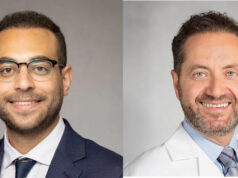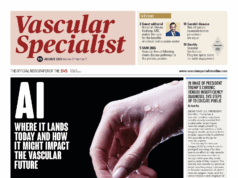 A research team in Dallas demonstrated the successful operation of transcarotid artery revascularization (TCAR) in a community practice setting, reporting results in line with large-scale TCAR trials.
A research team in Dallas demonstrated the successful operation of transcarotid artery revascularization (TCAR) in a community practice setting, reporting results in line with large-scale TCAR trials.
Among the 279 TCAR procedures the investigators analyzed, they found a major adverse cardiac event rate of 2.5%, a stroke rate of 1.1%, and a 0.7% mortality rate. This compares favorably with the rates found in the multicenter ROADSTER and CREST trials, the researchers reported. In the case of ROADSTER 2, the equivalent major rates were 1.7% for major adverse cardiac events, 1.4% for strokes and 0.2% for deaths.
The results were presented at the virtual annual meeting of the Texas Society for Vascular and Endovascular Surgery (TSVES), held Nov. 6–7, by Ashlee Vinyard, MD, a vascular surgery fellow at Baylor University Medical Center in Dallas. The research team included Texas Vascular Associates partner William Shutze, MD, chair of the Society for Vascular Surgery (SVS) Clinical Practice Council.
The researchers set out to produce data to help fill a void of reported TCAR experience from the community-based practice environment.
They retrospectively reviewed 281 patients undergoing TCAR from December 2016 to February of this year. The subtraction of two conversions left 279 cases in the study. Association between 30-day major adverse cardiac events and continuous variables were evaluated.
High-risk anatomic factors included an age of 75 or greater (135), high lesion (103), hostile neck (50), post-carotid endarterectomy restenosis (32), bilateral stenosis requiring treatment (14), spine immobility (12), laryngeal nerve palsy (10), tandem stenosis (5) and contralateral occlusion (1). The researchers reported that 50.5% were asymptomatic.
The study revealed a total of seven perioperative events from the cohort (three strokes, two myocardial infarctions and two deaths). Mean procedure time was 50.46 minutes. ROADSTER 1 reported 73.6 minutes, the researchers said.
Additionally, they reported that preoperative imaging with ultrasound only was safe without increasing the risk of major events.
“This report demonstrates that a TCAR program can be successfully launched in a community setting with results comparable to the large-scale TCAR trials and nationwide registries,” they concluded. “In our experience, performing the procedure under local anesthesia increases the risk of [major adverse cardiac events] but duplex ultrasound was found to be safe for preoperative imaging and case planning.”












